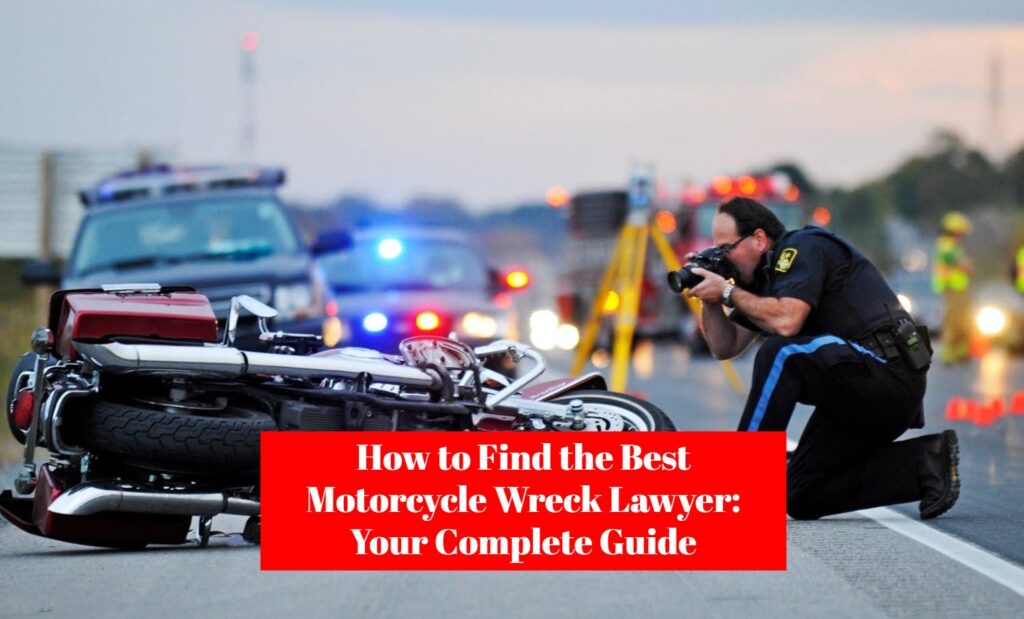Best Motorcycle Wreck Lawyer: Motorcycle accidents can be devastating, often leading to serious injuries, emotional distress, and financial burdens.
If you’ve been in a motorcycle wreck, hiring the right lawyer is crucial to securing fair compensation. But how do you find the best motorcycle wreck lawyer?
This guide will walk you through everything you need to know, from understanding why legal help is essential to evaluating attorneys and avoiding common mistakes.

Why You Need a Motorcycle Wreck Lawyer
Motorcycle accident cases can be more complex than typical car accidents. Insurance companies often try to blame the rider, and legal loopholes can make getting compensation difficult.
Here’s why hiring an experienced motorcycle accident lawyer is essential:
- Understanding Motorcycle-Specific Laws: A specialized lawyer knows the unique laws surrounding motorcycle accidents and rider rights.
- Fighting Insurance Companies: Insurers often try to minimize payouts. A lawyer ensures you get fair compensation.
- Handling Legal Procedures: From gathering evidence to filing claims, a lawyer navigates the complex legal process for you.
Qualities to Look for in a Motorcycle Wreck Lawyer
Not all lawyers are equal. When choosing a motorcycle wreck lawyer, look for the following qualities:
- Experience in Motorcycle Cases: A lawyer who specializes in motorcycle accidents understands the unique challenges these cases present.
- Proven Success Record: Check their past settlements and trial wins.
- Strong Negotiation and Trial Skills: Some cases go to court, so your lawyer must be a skilled litigator.
- Good Communication: You need someone who keeps you informed and answers your questions promptly.
Where to Find a Motorcycle Wreck Lawyer
Finding a qualified lawyer may seem overwhelming, but here are some effective ways to locate one:
- Online Directories: Websites like Avvo, Justia, and Martindale-Hubbell list lawyers with ratings and reviews.
- State Bar Associations: Most state bar associations provide lists of certified lawyers.
- Recommendations: Ask fellow riders, friends, or family members for referrals.
- Legal Aid Organizations: Some nonprofit organizations help accident victims find legal representation.
How to Evaluate Potential Lawyers
Once you have a list of potential lawyers, you need to narrow it down. Here’s how to evaluate them:
- Check Their Credentials: Ensure they have the proper licenses and certifications.
- Review Case Results: Look for successful settlements and verdicts.
- Read Client Testimonials: Previous clients’ experiences can give you insight into how the lawyer handles cases.
- Assess Their Availability: A good lawyer should be responsive and dedicated to your case.
Questions to Ask a Motorcycle Wreck Lawyer Before Hiring
Before making a decision, schedule a consultation and ask these critical questions:
- How much experience do you have with motorcycle accident cases?
- What is your fee structure?
- What is your success rate with cases like mine?
- How will you communicate updates about my case?
- Do you have trial experience?
Understanding Lawyer Fees and Payment Structures
Motorcycle accident lawyers typically work on a contingency fee basis, meaning they only get paid if you win. Here’s what you need to know:
- Contingency Fee: Usually 25-40% of the settlement.
- Additional Costs: Some lawyers charge for court fees, expert witnesses, and administrative costs.
- Clear Agreements: Always get a written contract outlining the fees.
Common Mistakes to Avoid When Hiring a Lawyer
Hiring the wrong lawyer can cost you your case. Avoid these mistakes:
- Choosing Based on Price Alone: Cheap lawyers may lack experience.
- Failing to Check Credentials: Always verify licenses and certifications.
- Not Asking About Trial Experience: Some lawyers only settle cases and avoid trials.
- Ignoring Reviews: Client feedback is a valuable resource.
Steps to Take After a Motorcycle Accident
- Seek Medical Attention: Your health is the priority.
- Document the Scene: Take photos, collect witness information, and write down what happened.
- Report the Accident: Notify the police and get a copy of the report.
- Contact a Lawyer: The sooner you get legal representation, the better.
How a Motorcycle Wreck Lawyer Can Help Your Case
A motorcycle accident lawyer plays a crucial role in building your case and ensuring you get the compensation you deserve. Here’s how they can help:
- Investigating the Accident: Lawyers gather police reports, witness statements, and expert testimonies to strengthen your case.
- Collecting Evidence: This includes medical records, traffic camera footage, and accident reconstruction analysis.
- Negotiating with Insurance Companies: Insurers often try to lowball victims, but a lawyer ensures you get a fair settlement.
- Representing You in Court: If a settlement isn’t reached, your lawyer will fight for you in front of a judge and jury.
Timeline of a Motorcycle Wreck Case
Understanding the legal process can help set realistic expectations. A motorcycle wreck case typically follows these steps:
- Initial Consultation: Meet with your lawyer to discuss the case.
- Investigation and Evidence Collection: Gathering proof to support your claim.
- Filing a Claim: Your lawyer submits claims to the insurance company or files a lawsuit.
- Negotiation Phase: Most cases settle before trial.
- Going to Court: If negotiations fail, your lawyer will present your case in court.
- Final Verdict or Settlement: You either receive a settlement or a court judgment.
Dealing with Insurance Companies
Insurance companies are notorious for using tactics to minimize payouts. Here’s what you need to know:
- Don’t Accept the First Offer: Initial offers are often far less than what you deserve.
- Watch Out for Recorded Statements: Insurers may twist your words to reduce liability.
- Let Your Lawyer Handle Negotiations: A skilled lawyer will maximize your compensation.
Compensation You Can Claim in a Motorcycle Accident Case
Motorcycle accident victims can claim various types of compensation, including:
- Medical Expenses: Covers hospital bills, surgeries, and rehabilitation.
- Lost Wages: Compensation for missed work and reduced earning capacity.
- Pain and Suffering: Covers emotional distress and physical pain.
- Property Damage: Reimbursement for motorcycle repairs or replacement.
- Punitive Damages: Additional compensation in cases of extreme negligence.
Legal Rights of Motorcycle Accident Victims
Understanding your rights is key to securing compensation. Here are the most important legal aspects:
- Personal Injury Laws: These laws determine who is liable for the accident.
- Statute of Limitations: Most states have a time limit (usually 2-3 years) for filing a lawsuit.
- Comparative Negligence: If you are partially at fault, your compensation may be reduced based on your level of fault.
Conclusion
Finding the best motorcycle wreck lawyer is essential for securing the compensation you deserve. By researching potential lawyers, asking the right questions, and understanding the legal process, you can make an informed decision.
Don’t rush the process—your choice of attorney can make or break your case.
If you’ve been in a motorcycle accident, don’t wait—consult a lawyer as soon as possible to protect your rights.
Best Motorcycle Wreck Lawyer: Frequently Asked Questions (FAQs)
Q. How much does a motorcycle wreck lawyer cost?
Most motorcycle wreck lawyers work on a contingency fee basis, meaning they only get paid if you win. The fee is typically 25-40% of your settlement.
Q. What should I do immediately after a motorcycle accident?
Seek medical attention, document the accident scene, report the accident to the police, and contact a lawyer as soon as possible.
Q. How long does it take to settle a motorcycle accident case?
The timeline varies, but most cases settle within a few months to a year. If the case goes to trial, it could take longer.
Q. Can I handle my motorcycle accident claim without a lawyer?
You can, but it’s not recommended. Insurance companies may take advantage of you, and without legal knowledge, you risk getting a lower settlement.
Q. What if the accident was partially my fault?
You may still be eligible for compensation under comparative negligence laws, but your settlement may be reduced based on your level of fault.



